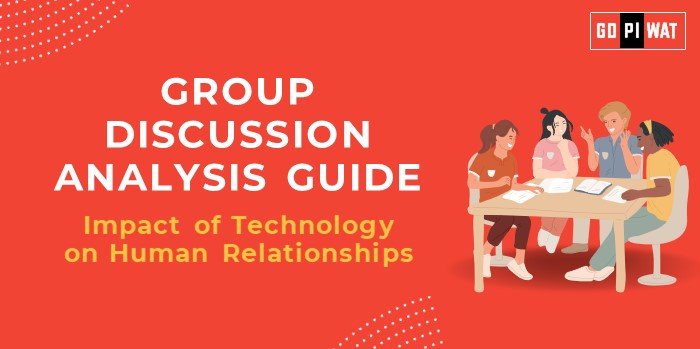📋 Impact of Technology on Human Relationships – Group Discussion Analysis Guide
🌐 Introduction to the Topic
In the 21st century, technology has become deeply intertwined with daily life, reshaping personal, professional, and social interactions. The widespread adoption of digital communication, social media, and instant messaging has redefined how people connect and maintain relationships. While technology enables long-distance connections, questions arise about its impact on the quality, depth, and authenticity of these relationships.
📊 Quick Facts and Key Statistics
- 🌍 Social Media Users: Over 4.5 billion globally, showcasing the massive reach and influence of social media on human interaction.
- 🕒 Average Daily Time Spent on Digital Devices: 7 hours (Global Digital Report 2023), indicating how technology permeates daily life.
- 📱 Digital Connections: 68% of adults report connecting with loved ones via digital platforms, often preferring text over face-to-face interaction.
- 📉 Decline in Social Skills: 43% of surveyed young adults feel digital communication has impacted their social interaction skills.
🤝 Stakeholders and Their Roles
- 🔬 Technology Companies: Innovate platforms for interaction (e.g., Meta, Apple) and influence social habits.
- 👥 Users/Consumers: Drive platform usage and shape interaction patterns based on preferences.
- 🏫 Educational Institutions: Research the effects of digital communication on mental health and social skills.
- ⚖️ Policy Makers: Address digital wellness concerns and promote responsible tech usage.
🏆 Achievements and Challenges
✨ Achievements:
- 🌐 Connectivity: Technology enables connections across geographies, allowing family, friends, and professionals to maintain relationships.
- 🧠 Support Networks: Mental health apps and support groups foster relationships and provide resources.
- 🌍 Cultural Exchange: Technology fosters cross-cultural interactions, broadening perspectives and fostering inclusivity.
⚠️ Challenges:
- 👥 Reduced Face-to-Face Interaction: Heavy tech reliance has led to a decline in in-person communication skills, affecting interpersonal bonds.
- 😟 Mental Health Impacts: Research shows a correlation between heavy social media use and feelings of loneliness or anxiety.
- 🔒 Privacy Concerns: Digital footprints and shared data can strain relationships due to privacy and trust issues.
Japan: Faces challenges with social isolation due to increased digital interactions.
Norway: Actively promotes “offline” family time, encouraging a balance between digital and in-person relationships.
💬 Structured Arguments for Discussion
- Supporting Stance: “Technology has allowed families and friends to stay connected despite distances, fostering long-distance relationships and creating support networks online.”
- Opposing Stance: “Increased reliance on digital communication is eroding the quality of relationships, with studies indicating that face-to-face interaction is more effective for maintaining close bonds.”
- Balanced Perspective: “While technology connects people, it also challenges interpersonal connection quality. Finding a balance between digital and physical interaction is essential for sustaining meaningful relationships.”
📈 Effective Discussion Approaches
- Opening Approaches:
- 📖 Start with a personal anecdote about digital communication’s impact on a relationship.
- 📊 Use a statistic to highlight the prevalence of digital interaction.
- ⚖️ Contrast the benefits of physical and digital communication.
- Counter-Argument Handling:
- ✅ Recognize the positive role of technology but argue for balanced use.
- 📚 Cite studies showing how social skills can degrade with overuse of digital platforms.
🔍 Strategic Analysis of Strengths and Weaknesses
✔️ Strengths:
- 🌍 Connects across distances, supports quick communication, offers flexible interaction options.
❌ Weaknesses:
- 🧠 Can reduce empathy and social skills, heightens privacy risks, risks of addiction.
🌟 Opportunities:
- 📲 Promoting “digital wellness” and balanced tech use, enhanced mental health support.
⚠️ Threats:
- 📉 Further decline in social skills, increase in mental health challenges, privacy violations.
🎓 Connecting with B-School Applications
Real-World Applications: Understanding the dynamics of digital vs. traditional networking is essential for leadership and interpersonal skills.
Sample Interview Questions:
- 🗨️ “How do you think technology has reshaped professional networking?”
- 📲 “What are the advantages and disadvantages of managing relationships digitally?”
💡 Insights for B-School Students: Focus on balancing digital proficiency with interpersonal skills; consider exploring digital wellness or remote communication strategies for group projects.


